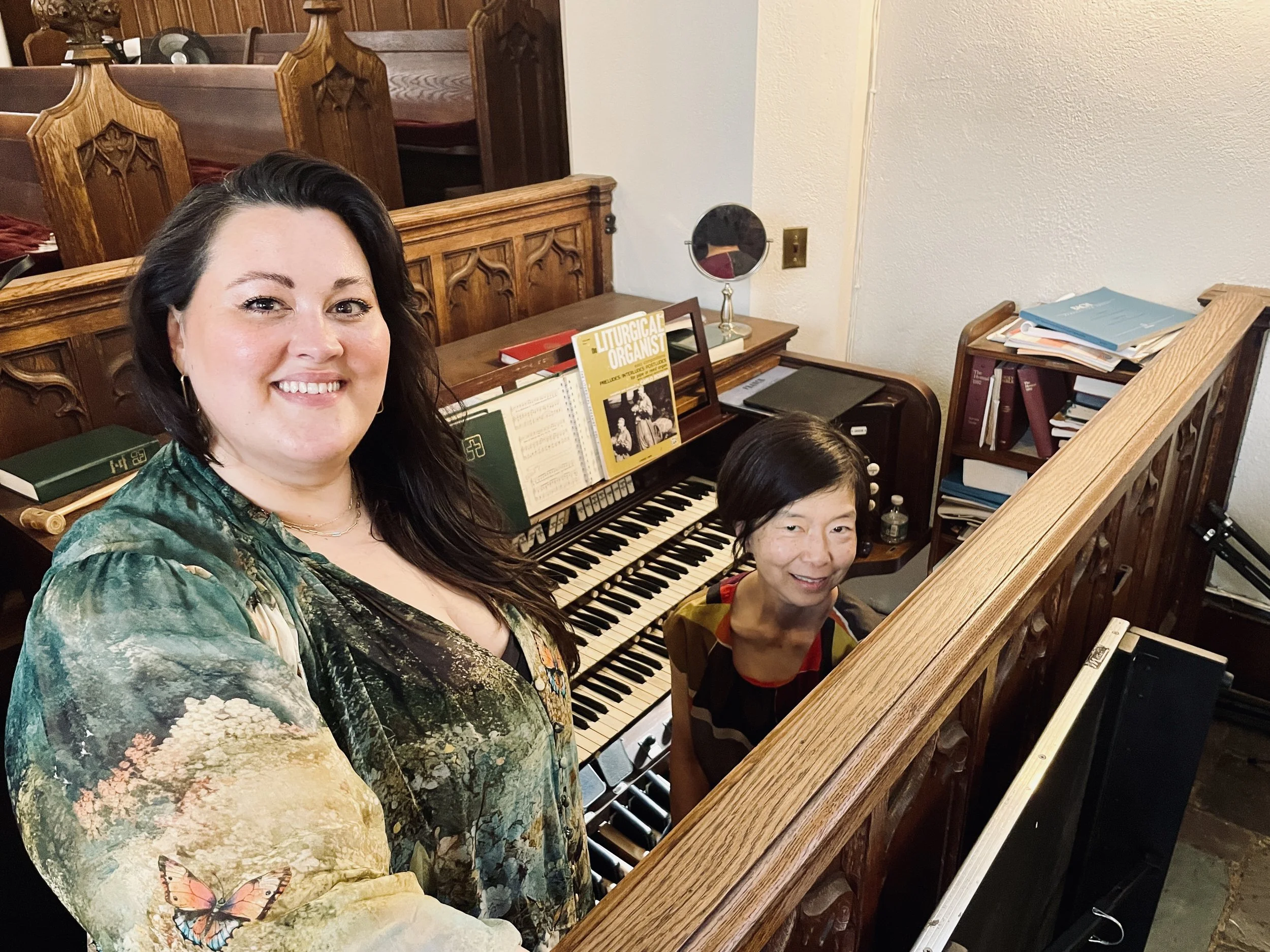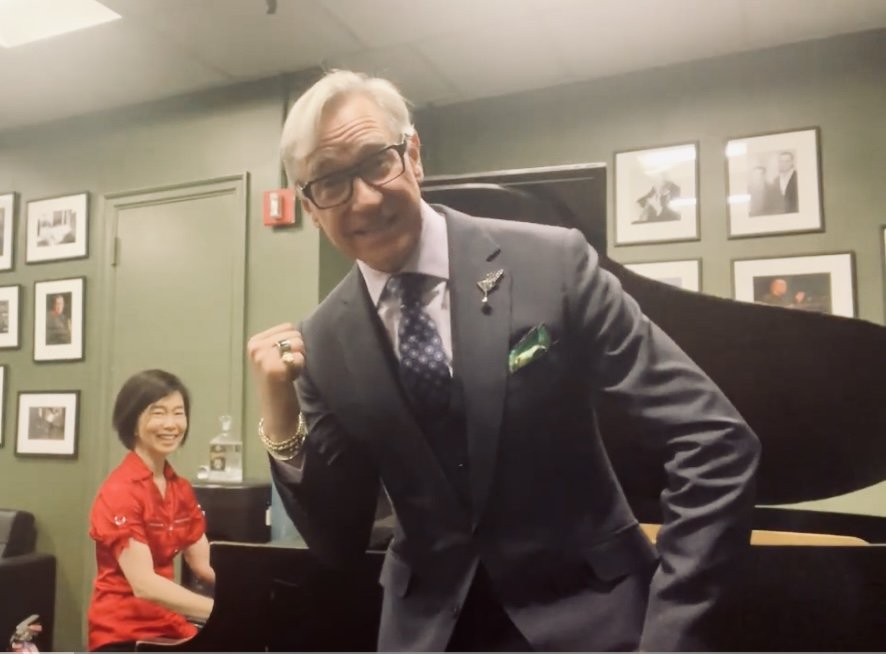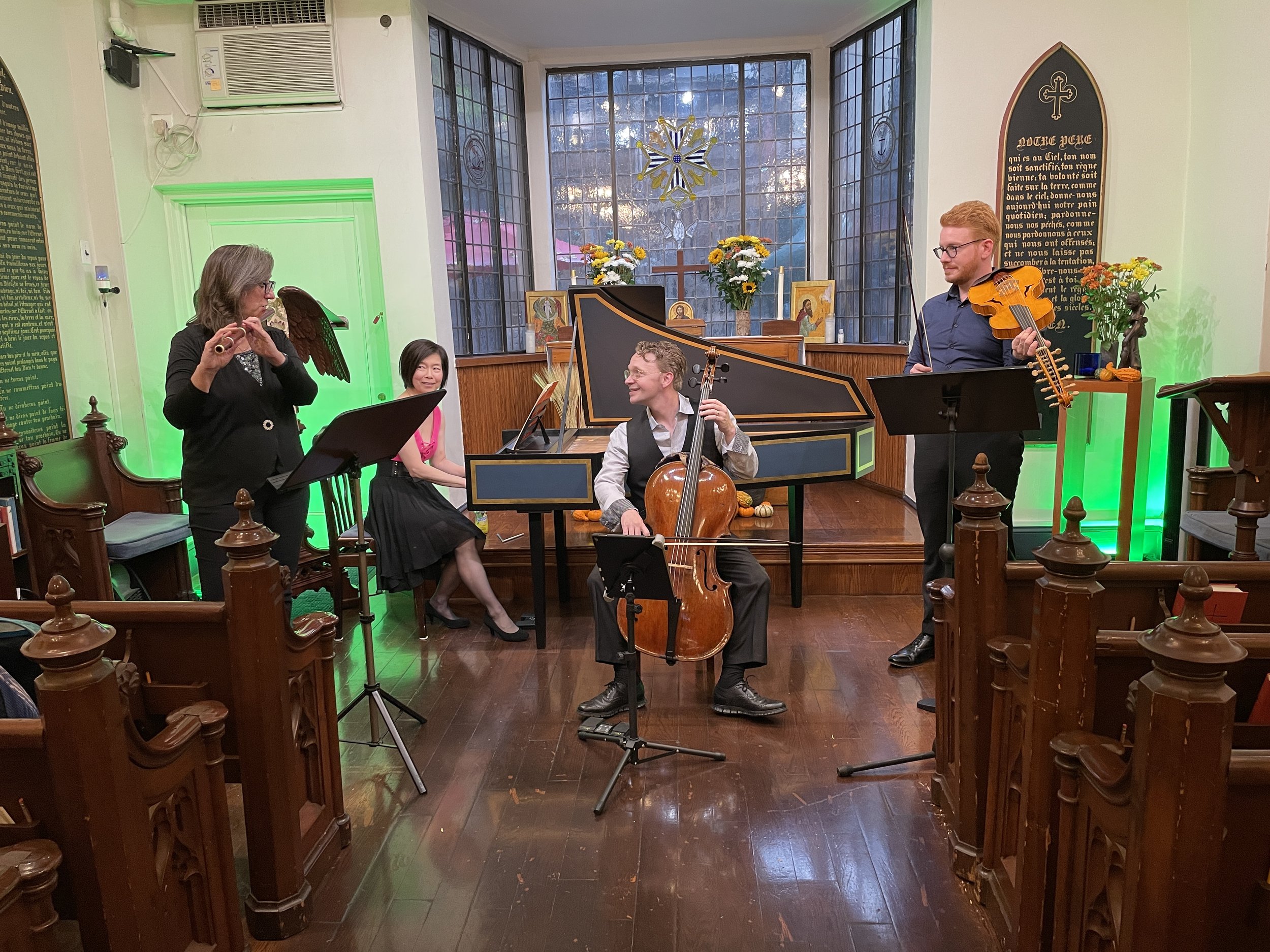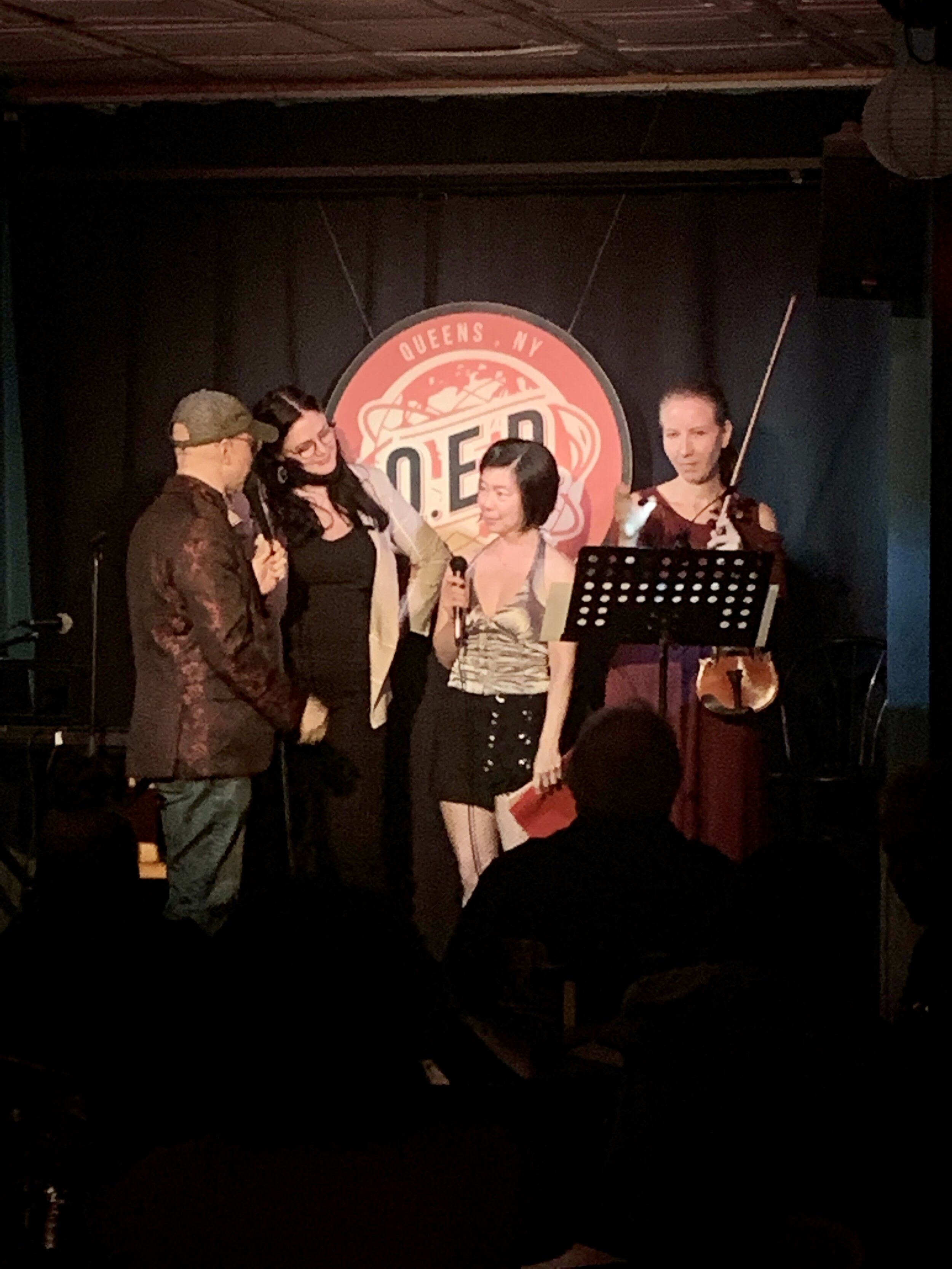Subbed at historic Trinity Lutheran Church (Astoria, Queens NY), a stone church built in the English Gothic Revival style. The organ is from 1926 (a Skinner organ, renovated by Moller in 1967). Here I am with soprano Laura Ethington.
L-R: Susan Graham, Nancy Kito, Alexandra Calabro, Allen Maracle
Ensemble Leonarda (Susan Graham, flute; Nancy Kito, harpsichord; Alexandra Calabro, violin; Allen Maracle) played a concert “Summer Soirée” which featured those golden chestnuts of music we’ve played through the years. About 25 people made for a full and enthusiastic audience. Our venue was the very hip City Lore Gallery on the Lower East Side. #GoodTime #LiveMusic #BaroqueMusic #CityLoreGallery
Welp, The Slipper Room is known for its burlesque shows. But Wenqi Li (flute) and Nancy Kito (piano) took it by storm, playing on The NYC Talent Show and performing Francois-Joseph Gossec’s “Tambourin”. The room decor was bordello red, a stuffed raven sat atop the piano (shades of Edgar Allen Poe?), and a painting of a naked lady reminiscent of Les Liaisons Dangereuses adorned the wall.
Nancy Kito & Paul Feig
The one where baroque musician Nancy Kito meets film director / author Paul Feig…
As you may know, in 2019 a little thing called COVID disrupted the world and everything that we knew as “normal”. Emmy-award winner Paul Feig (Freaks & Geeks, Bridesmaids, and more) did a “quarantine cocktail” Instagram show every week, and highlighted worthy causes / charities to donate to as the world was reeling, all the while dancing his way to Italian pop or other popular songs, broadcasting to our homes every week through the magic of social media. I first came across his posts because The Washington Post did an article on entertainers who took to online shows thinking the pandemic would soon be over and our own gamba player, Sarah Stone, was mentioned in the same article.
Paul’s come out with a book, “Cocktail Time!”, as well as launching his own brand of gin, Artingstall’s which is as smooth as he is (almost). Here is a little video we did after his booksigning. See his world and mine cross paths, as Paul dances to a 17th century minuet. Click on the link below to watch me and my partner in crime Paul Feig, classical music mixes well with cocktails!
Had a blast playing our concert on Oct. 23, 2022 at the historic French Church du St. Esprit. Featuring the music of the 2 Georges, Handel & Telemann. L-R: Susan Graham, flute; Nancy Kito, harpsichord; Nathan Whittaker, cello; Dan McCarthy, viola d’amore.
L-R: Susan Hahn Graham, Nancy Kito, Claire Smith Bermingham, Cullen O’Neil, Dan McCarthy
So there we were on Sunday Feb. 20, 2022, streaming live from my living room in NYC! We were not quite ready for an in-person recital so we brought the music to you. Streamed across YouTube, Facebook, Instagram, Twtich TV, and Twitter, our concert featuring Dan McCarthy on viola d’amore was watched by people near and far, California, Cape Cod, Asia (Japan, Taiwan, and Hong Kong).
For us, ‘twas interesting talking to an audience we couldn’t see, but we’ve leapt into the 21st century, availing ourselves of the technology that helped us during the COVID era.
Watch on YouTube, click here: “That’s d’Amore” live-streamed concert
Well, here we are again, entering yet another year of the pandemic (you’ll notice they stopped calling it COVID-19, since we’re now in 2022! I played organ for Christmas Eve & Day, 12 people and 7 people respectively. People are afraid to go out. And the chances that one tests positive is narrowing; in the past 2 weeks, there are about 20 of my friends/ colleagues who’ve gotten it (I’m talking fully vaxxed & boostered). So, I’m bringing the music to you virtually, in the safety of your own space. ICYMI online, here is this year’s Christmas video, music from many lands (with a teensy bit of humor from yours truly…). Stay safe & be well!
We were one of 6 featured performers on a special edition of The NYC Talent Show, held at QED Astoria on Sept. 13, 2021. Did a little John Stanley. Special thanks to host Victor Varnado!
Well, here we are, still in quarantine lockdown and it was rather difficult getting into the holiday spirit… Having far too much free time on my hands, I came up with this multi-layered holiday video. One of my fave holiday shows was John Denver & The Muppets Christmas special. They did “Christmas is Coming”, which is a round like “3 Blind Mice”. But with quarantine, I had no one to sing with me so I did it all myself! (I guess “I’ll be Clone for Christmas!”)
The COVID19 epidemic threw a huge wrench into the world’s machinery. Family life, school, entertainment, society, the world, the universe. The alternative platforms performers were forced to use for their art forms, well, some of them work better than others. For those of us who are musicians, it has been a challenge. Apps like Skype or Facebook Live or Zoom are problematic. Unlike comedy or drama, or interviews, music has to be dead on (particularly classical music). I have seen performances where I couldn’t watch the screen because the movements didn’t match what I was hearing (like a very badly dubbed foreign film). We classical music peeps have been using an app called Acappella, which allows for remote performances. It’s true it’s not “live” but at least we’re in sync!
It’s the year 2020 and Ensemble Leonarda is celebrating the 400th anniversary of Isabella Leonarda, the Italian Ursuline nun / composer (born 1620), our namesake. We have a very special concert on Monday, March 2, 2020 at Marc A. Scorca Hall at The National Opera Center, entitled “Wonder Women”!
Elisabeth Jacquet de la Guerre was a contemporary of Francois Couperin; among her works were pieces for harpsichord, instrumental sonatas and 3 books of cantatas. She played for Louis XIV at a young age and was accepted at the French court, and her education supervised by Madame de Montespan. The cantata “Le Sommeil d’Ulisse” will be performed, with artwork by Victor Varnado (cartoonist for The New Yorker).
We are also pleased to collaborate with composer Elizabeth Brown in a preview performance of her new work for baroque band, voice, and shamisen. This piece, “A Glimpse at Dawn” will feature shamisen player & vocalist Yoko Reikano Kimura.
What is a shamisen? you may well ask. It is a traditional Japanese 3-stringed instrument. Did you know? Its strings are made of silk, which are dyed with turmeric. Also, it is played with a plectrum called a bachi.
Wonder Women of the Baroque…& beyond!
Come see for yourself on March 2nd !
Mon. March 2, 2020 at 8pm, Marc A. Scorca Hall at The National Opera Center, 330 Seventh Avenue, NYC
Tickets: $20/ $15
Ah, the viola. The viola is a much maligned instrument, the butt of countless jokes (see below).
What's the difference between a violin and a viola?
The viola burns longer.
The viola holds more beer.
You can tune the violin.
But on Nov. 13, we played Bach’s beloved Brandenburg Concert No. 6 and guess what? the 2 solo lines are for viola! There are no violins on this one and so the violas (finally) get the chance to shine!
Then there were musical mysteries, some which we could explain and some we could not. For example Francois Couperin’s pastoral rondeau for harpsichord “Soeur Monique” was either about a nun or ladies of light virtue. The Nymphs of the Rhine for 2 gambas, well, the last time I heard about Rhine maidens or sprites was in Wagnerian operas.
L-R: Dan McCarthy & Kyle Miller (viola); Anneke Schaul-Yoder, cello; Nancy Kito, harpsichord; Arnie Tanimoto & Adam Young, gamba.
April 28, 2019: We teamed up with artist Victor Varnado, cartoonist for The New Yorker magazine to present Elisabeth Jacquet de la Guerre’s cantata, “Le Sommeil d’Ulisse” (“Slumber of Ulysses”).
Who the heck was Ulisses? There were the ancient Greek myths, with their own roster of gods, and then the ancient Romans with THEIR roster. So the Greeks had Zeus and Hera, and the Romans had Jupiter and Juno, Athena (get it ATHENS / Athena) became the Roman Minerva, and Odysseus became Ulysses (you say “poh-tay-toe” and I say “poh-tah-toe”)
Synopsis: Frat boy Ulysses & his men, hijinks on the open sea, blinds the Cyclops Polyphemus (son of the god, Neptune). Neptune is pissed off, and sends a tempest. Cut to commercial, the goddess Minerva intervenes and puts Ulysses into a magical sleep, where he dreams about his glorious future. Et voilà ! an HEA (Happily Ever After). Susan Graham, flute; Claire Bermingham, violin; Ana Kim, cello; Nancy Kito, harpsichord; Christina Kay, soprano; artist Victor Varnado (cartoonist, the New Yorker).
Watch the tempest scene here:
Ensemble Leonarda is pleased this season to feature concerts with “Friends”, guest musicians from VA, PA, and Montreal, Canada.
First up is Curt C. Christensen, former principal trumpeter of the U.S. Air Force Concert Band. Nancy Kito recounts their first meeting.
NANCY: I first met Curt when he was 19 and a student at Juilliard. I was organist for a small Lutheran church in Astoria, Queens, & you know, these little churches have a little extra $$ for special music at Christmas and Easter. I booked Curt through the Juilliard Placement Office, and we were to meet at Juilliard in the lobby. Now, this is before the Internet, smartphones, and Facebook. We were actually standing about 3 feet apart next to each other, looking out for each other, till I finally noticed his instrument case and asked, “Hey, are you Curt?”
Curt C. Christensen, trumpet
The piece was the Telemann Concerto in D Major, and so we started rehearsing. After the first run-through, I said, “Wow, that’s awesome, but do you think we could slow down the first movement?” and we did. Then I asked for it even slower, because “You know, I have this recording stuck in my head and I really liked the interpretation.” Finally, Curt put down his instrument and asked, “So, can I ask which recording you have?” and I said, “Oh, it’s by some French guy named Maurice André”.
Curt almost passed out [for those of you unfamiliar, Maurice André is the trumpet god, he’s like the Jordi Savall, the Itzhak Perlman, the Yo-Yo Ma of trumpeters]. We never did play it that slowly! (but we were a success nonetheless). I lost track of him but then by chance the USAF Concert Band was playing a concert at the Tilles Center where I was the House Manager, and we’ve kept in touch ever since.
We’re pleased to be reprising the Telemann Concerto as well as a Torelli, concerto, and a piece I’d not heard of before, “Aria di Postiglione” from the Capriccio on the departure of a beloved brother - BWV 992 (an early work) by J.S. Bach.
Concert: T3 [Telemann, Torelli, & Trumpet]. Sun. Dec. 2, 2018 at 4:00pm at St. Michael’s Church, 225 W. 99th Street, NYC. Info: bit.ly/1VHLOJe
Ensemble Leonarda, along with Adam Grannick & his Filmelodic, was pleased to be part of GroupMuse MassiveMuse on May 24, at MayDay Space in Brooklyn. It was a three-peat of our joint live music + film project (the film being "La Folia").
Filmelodic is an award-winning collective that makes short, narrative films to accompany beloved works of classical music to give the crowd an immersive, multi-sensual experience. that takes you in so close to this music.
The program also featured Johan Halvorsen’s Sarabande with Variations, accompanied by Brooklyn-based visual artist Lila Nadelmann creating original art live to the music. Followed by JS Bach’s beloved Brandenburg Concerto No. 3 in G major. The finale was Filmelodic's award-winning short film La Folia, set to a Concerto Grosso in D minor by Francesco Geminiani, performed live along side the film, which has been screened all over the country.
"Music from the Court of Dresden": Sunday, February 11, 2018 at 4pm, French Church du St. Esprit, 109 E. 60th St. NYC. Tickets $20/$15.
Ensemble Leonarda explores baroque music played at the Court of Dresden. Here, Casey Ann Reinke explains why you should be intrigued...
<<Dresden. No, not just fine china. The court of Dresden & music. Where do we begin? Dresden was the capital city of the Free State of Saxony in Germany, near the border of the Czech Republic (remember this for later). Augustus II nicknamed "The Strong" (a.k.a. known as Friedrich Augustus I Elector of Saxony) caused quite a stir when he converted to Catholicism in 1694 in order to become King of Poland. A patron of the arts, composers, instrumentalists, and singers flocked to Dresden to hear and to be heard. These included Bohemian composers Jan Zelenka, Johann Benda, Frantisek Tuma, and Biber. Heinrich Biber, not Justin. [I say Bohemia and you think "Rhapsody", but Bohemia is the westernmost and biggest historical part of what is now the Czech Republic].
Telemann, Handel & Bach also visited Dresden. The court orchestra featured such musical talent as violinist Pisandel (who'd studied w/ Torelli & had met Vivaldi); Quantz, the most outstanding flutist of his time; Hasse whose passion was opera, and others.
There's a whole lot more to discover (and hear!) >> -C.A.Reinke
On Nov. 2, 2017 at The National Opera Center, Ensemble Leonarda presented a concert in collaboration with Adam Grannick's Filmelodic "La Folia" project. A 12-minute visual anthology of 24 vignettes, featuring live music of Francesco Geminiani. The concert also featured works by some of the 150 other baroque composers who wrote works on the theme.
Last year, the New York Philharmonic Community Engagement Department invited our baroque band to participate in their New World Initiative Project. In 1893, Antonín Dvořák was commissioned by the NY Philharmonic to write the "New World" Symphony; and during the 2016-17 season, different diverse ensembles were invited to participate by performing all or part of the New World Symphony. The resulting videotaped performances would be part of the NY Philharmonic Digital Archives. Our concert was Feb. 16, 2017 at 7pm at the National Opera Center, and the Deputy Consul General of the Czech Republic in New York, Karel Smékal, attended.
April 12, 2015 concert. L-R: Marika Holmqvist, Nancy Kito, Rob Paravonian, Claire Smith.
YouTube comedic sensation Rob Paravonian guest starred on our April 12, 2015 concert. Having mutually followed each other on Twitter, we asked if he'd play a movement from a Corelli trio sonata, which had the same bass line as the Pachelbel Canon in D Major (subject of Rob's "Pachelbel Rant")
Rob agreed to play, but I kept it from our other members.
"So how do you know Nancy?" "Ummm, she came to one of my concerts..."
Rob Paravonian (of "Pachelbel Rant" fame) reveals his true identity to Ensemble Leonarda and audience.
Ensemble Leonarda (Marika Holmqvist, violin; Nancy Kito, harpsichord; Rob Paravonian, guitar; Claire Smith, violin), channeling Corelli.










